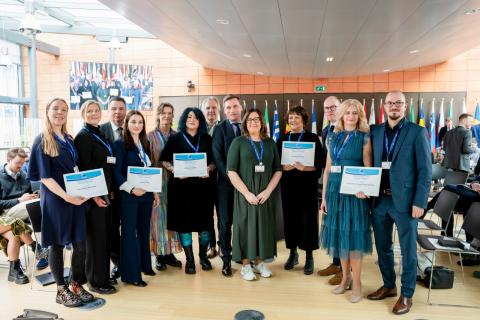European Economic
and Social Committee
Ireland's Third Age Foundation wins EESC Civil Society Prize for mental health
The Irish charity earned the prize with its social engagement network AgeWell, which battles loneliness in old age
On 7 March, the European Economic and Social Committee (EESC) rewarded five non-profit organisations for their outstanding contribution to fighting mental health disorders, which have risen dramatically in the EU.
The 50 000 prize was shared among the five winning projects.
The Irish charity Third Age Foundation took home the first prize of EUR 14 000.
The other four runners-up each received EUR 9 000 and were ranked as follows:
- 2nd place: Pro Lapinlahti association, FINLAND, for its community centre Lapinlahden Lähde
- 3rd place: Integra, SLOVAKIA, for its ‘Crazy? So what!’ initiative
- 4th place: Lilinkoti Foundation, FINLAND, for its The World of Recovery games
- 5th place: Animenta organisation, ITALY, for its project Telling Stories for Good
At the award ceremony held during the EESC's inaugural Civil Society Week, the EESC President Oliver Röpke said: I warmly congratulate the winners and all the candidates who participated in this year's edition of the Civil Society Prize. Their work on mental health is truly inspiring and should be recognised also at EU level. People across the EU, young and old, are increasingly struggling with mental health. Anxiety and depression spiked across Europe. Civil society plays a pivotal role in providing services that are currently not adequately supplied by the public health system, with particular attention to the special needs of vulnerable groups. Today we are honouring civil society in action.
Awarding the prizes, EESC Vice-President for Communication, Laurențiu Plosceanu, said: Mental health disorders such as anxiety, depression and eating disorders have increased across Europe. Mental health disorders may be a silent epidemic, but it is certainly a huge epidemic. With this prize, our Committee wants to break this taboo and talk about mental health and mental wellbeing. And we also want to highlight the work that civil society does to improve mental wellbeing.
FIRST PRIZE WINNER
With its social engagement network AgeWell, the Irish charity Third Age Foundation strives to battle loneliness in old age by offering companionship and help to those who are isolated, frail and vulnerable. Their unique service is community-based, where people over 50 support at-risk and in-need older people: they pay them regular visits, offering not only good company but also monitoring their health and wellbeing with the help of a phone-based App questionnaire. The information gathered is used to link the clients to appropriate services and offer concrete help. To date, more than 500 people have received support in Ireland's County Meath.
Third Age representative Alison Branigan said: It is important that older people are not forgotten. Precisely because they may not be visible, we need to remember the importance of community, community interventions and the power of social contact and social prescribing initiatives. Winning the EESC prize is a tremendous recognition of all our hard work and dedication over the last 5 years.
MORE ON OTHER WINNING PROJECTS
The second place went to the Finnish Pro Lapinlahti association and its community centre Lapinlahden Lähde or The Spring of Lapinlahti
. The centre, built through the renovation of Helsinki’s Lapinlahti Hospital, organises various workshops and events related to mental health literacy, boasting 50 000 visitors each year. Declared a diagnosis‑free zone, it allows everyone to be who they are without being labelled, offering empowerment instead of paternalism.
Placed third is the Slovak organisation Integra, with its Crazy? So what!
initiative, which breaks down stereotypes by promoting a compassionate understanding of mental health among young people. It provides first-hand insight into what it is like to have poor mental health and into the road to recovery.
The winner of the fourth prize, the Finnish Lilinkoti Foundation, is on a mission to support mental health with its innovative and creative games called The World of Recovery. Set in a futuristic world of hope, they promote a player’s journey to recovery through goals that inspire a healthy self-image, personal autonomy and an active and meaningful life. While the first is a non-violent mobile game, the second is an award-winning table top role-play game. The games target mental health and substance abuse recoverers, along with professionals, and are free to use.
The project Telling Stories for Good secured fifth place for Italy's non-profit organisation Animenta. With the project, Animenta is rewriting stereotypical narratives on eating disorders, which affect more than four million people in Italy alone, two million of whom are adolescents. Its prevention and awareness-raising programmes are carried out by volunteer professionals online and in schools across Italy and have so far reached 10 000 children.
The EESC launched the prize in July 2023 and dedicated it to mental health, to recognise the crucial role played by civil society in mental health treatment and prevention. The winners were chosen from over 100 applications from 23 Member States. The creativity and dedication of the submitted projects showcase civil society’s tremendous enthusiasm and strong motivation to help people battling with mental health issues, and demonstrate their vital contribution to curbing the explosion of this silent epidemic in the EU.
The prize, awarded for the 14th time, honours non-profit projects implemented by individuals, civil society organisations and companies. A different theme is chosen each year, covering an important area of the EESC’s work. The prize money and the recognition they receive should help the winners to scale up their projects and provide further help in their communities.
In 2022 the EESC exceptionally granted prizes for two themes: youth and help for Ukraine. In 2021, the prize rewarded climate projects promoting a just transition. In 2020, the EESC replaced its Civil Society Prize with a one-off Civil Solidarity Prize dedicated to the fight against COVID-19. Other past topics include gender equality and empowering women, European identities and cultural heritage, and migration.
